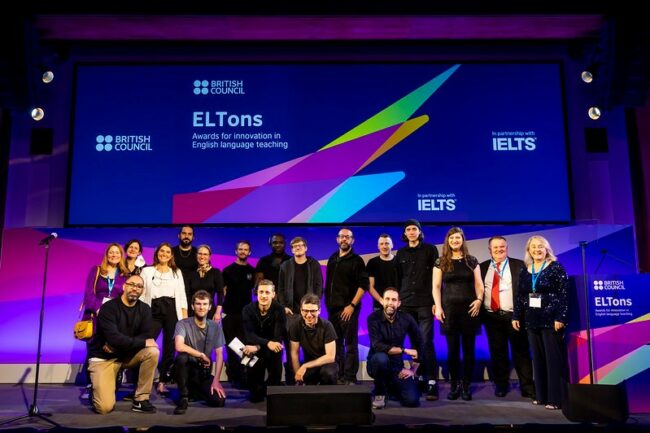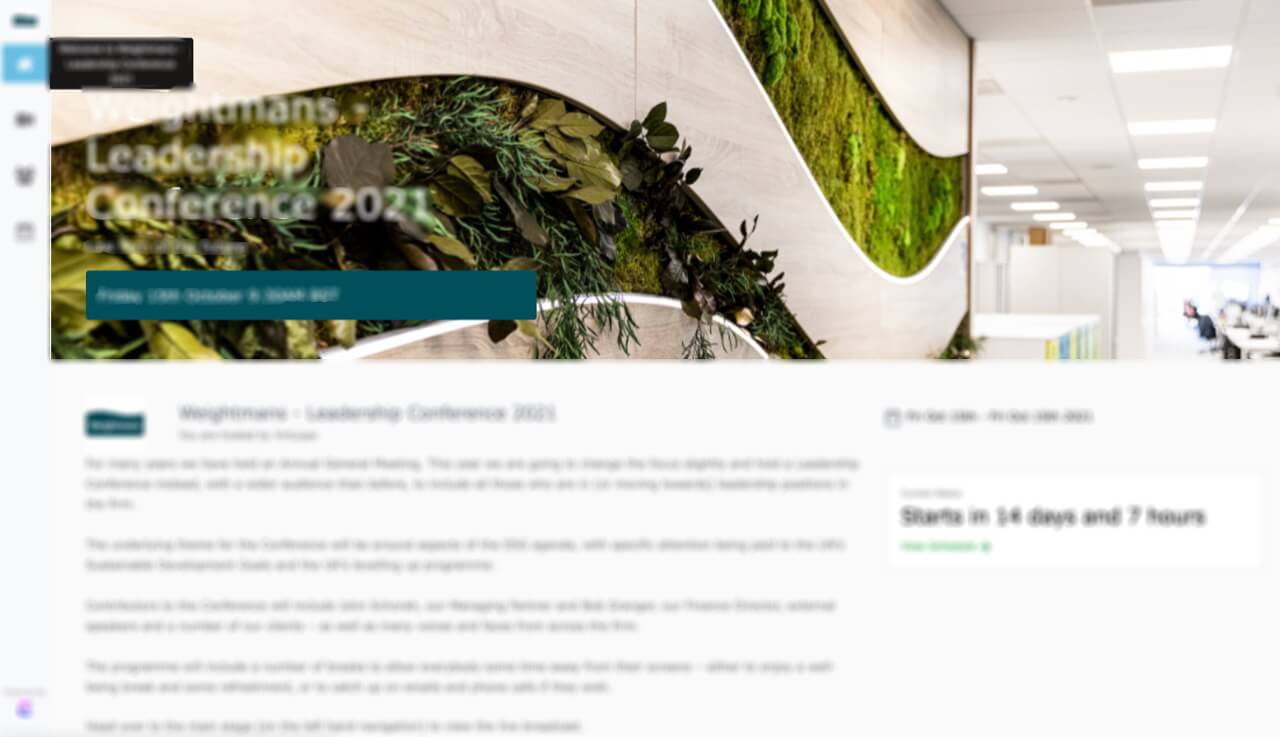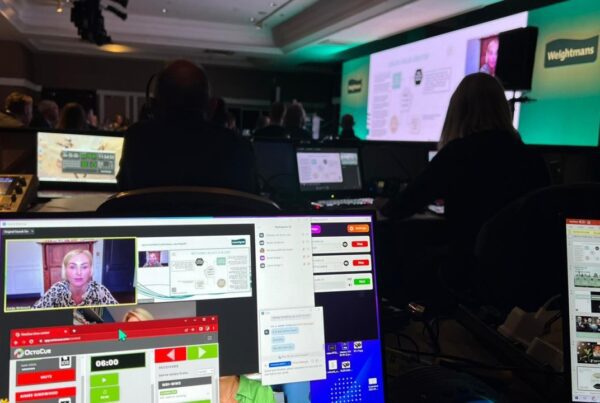Providing the real world face-to-face interaction that comes with in-person events, as well as the accessibility and sustainability of virtual events, hybrid events really do offer the best of both worlds.
What is a Hybrid Event?
A hybrid event combines the in-person and virtual event formats, allowing participants to decide whether to attend by travelling to a physical venue or join in remotely.
By giving attendees greater flexibility on how they take part, hybrid events can create a completely inclusive experience and encourage wider participation.
Covering all bases, those who prefer in-person attendance can still enjoy the benefits of being at a physical venue, while there is also an option to take part remotely with plenty of interactive elements to keep virtual audiences engaged.
In this guide, you will learn:
- What are the Different Types of Hybrid Events?
- 5 Benefits of Hybrid Events
- Example of a Hybrid Event
- Why Choose Hybrid?
What are the Different Types of Hybrid Events?
- Meetings
- Conferences
- Training sessions
- Sales events
- Product launches
- Trade shows
- Awards ceremonies
5 Benefits of Hybrid Events
Increased Attendance
Hybrid events often lead to higher attendance levels, compared to other event formats, with audiences being able to choose whether they participate in-person or remotely.
Eliminating the barriers to entry that come with physical events, such as geographical limitations, hybrid events allow delegates to attend from anywhere in the world.
Event organisers can increase reach and accessibility by incorporating a virtual element, enabling remote attendees to join with ease using a mobile phone, tablet, laptop or computer, which all support most virtual event platforms.
Hybrid events also align with today’s hybrid work trend, which sees many organisations allowing employees to work flexibly to encourage a greater work-life balance and improve overall job satisfaction.
Flexibility
Hybrid events provide flexibility and adaptability for event organisers, as well as attendees.
Allowing delegates to choose whether they attend remotely or in-person means an event can still go ahead as planned even if any unexpected challenges arise such as bad weather, travel disruption or issues at the venue such as flooding
Interactivity
Implementing interactive elements into a hybrid event can help keep both virtual and in-person participants engaged. Common ways of doing this include Q&A sessions, breakout rooms, polls and live chat.
For a seamless hybrid event experience, remote and in-person attendees can engage in activities simultaneously, for example, both could submit questions through a mobile event app, or vote on polls.
Networking opportunities can also be incorporated for both groups of attendees. Setting up meeting rooms or breakout rooms within the virtual platform can facilitate networking for those participating remotely, while allocating physical spaces or breaks in the schedule encourages interaction at the physical venue or conference centre.
Sustainability
Opting for a hybrid, rather than a solely in-person event, can help contribute to more sustainable business practices, reducing environmental impact.
Hosting a smaller number of delegates at an in-person event can lead to a lower carbon footprint, with less travel required, as well as fewer resources needed for printed materials and on-site catering.
Find out more about the sustainability of hybrid events
Greater Return On Investment
Hybrid events have the potential to offer a higher return on investment by reaching a much wider audience.
Remember, content can be made available to view on demand after the event has finished. Recordings can also be repurposed to highlight the success of your event through social media platforms, gaining exposure to new audiences and growing the reputation of your business.
In addition, the higher attendance levels of hybrid events can be hugely attractive to sponsors who can benefit from greater brand visibility.
Combining the virtual and in-person format can also be a more cost effective approach for event organisers looking to reach a wide audience without the expense of catering for a large number of delegates in-person.

Example of a Hybrid Event
The British Council ELTons Awards
The British Council ELTons Awards are designed to recognise and celebrate innovation in English language teaching around the world.
A perfect example of how the hybrid event format can bring delegates together, regardless of location, The British Council ELTons Awards show provided a truly global celebration of excellence.
A select number of guests were invited to attend a glitzy award ceremony at the IET Savoy London, hosted by BBC Radio 6 Music’s Lauren Laverne, while attendees from around the globe tuned into the action from the comfort of their own homes.
As the winners were revealed, those attending in-person were invited onto the stage to accept their awards, while winners joining remotely were brought to the screen.
The hybrid event featured a combination of live footage from various physical sites within the IET Savoy London, as well as pre-recorded content and stings. Online delegates were also encouraged to chat and network with on-site attendees.

The hybrid awards show, managed with Hopin, was a huge success. Connecting people around the globe, the event provided a highly engaging hybrid experience for both in-person and remote attendees.
Find out more about this hybrid event.
Why Choose Hybrid?
There are many considerations to make when it comes to choosing between hybrid, virtual and live events.
The right format for your business really depends on your event goals. If your aim is to make your event inclusive and accessible to as many people as possible, hybrid events are the way forward, with hybrid events experiencing an average of 40% higher attendance than in-person-only events.
The hybrid format offers attendees a more flexible experience, giving them a choice of how to participate, whether as remote attendees who join virtually or in-person guests who experience the event face-to-face.
Incorporating a virtual element also provides on-demand content, which can be made available afterwards, extending the lifespan and longevity of your event. Content can also be re-purposed and shared across social media channels.
Overall, the hybrid event format can facilitate larger audiences and lead to greater engagement. Combining virtual and in-person provides the best of both worlds so it’s no surprise to see hybrid events becoming a popular choice for business events.
To learn more about the benefits of a purely virtual event, take a look at our complete guide to virtual events.

Introducing a virtual aspect into your event can massively enhance your event and attract a much wider audience. While planning a hybrid event can create the need for more equipment and resources, the best way to handle the extra workload is to hire the services of a professional event team.
Partnering with a specialist company like Virtuopo is the best way to deliver a successful hybrid event, ensuring the best possible experience for your attendees. A professional events agency will bring knowledge and expertise to provide the highest standards of production and the most engaging level of event content.
Here at Virtuopo, we pride ourselves on delivering high-quality and reliable hybrid event management for a wide range of clients. If you would like to find out more about our services, please contact us on 0151 662 0275 or email info@virtuopo.com.





